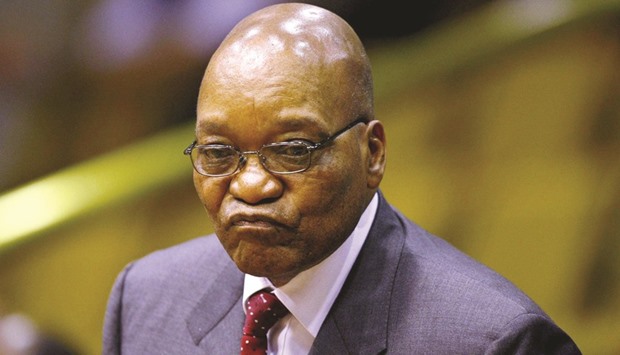South African President Jacob Zuma has denied acting dishonestly in a scandal over improper state spending at his private home, after a scathing court ruling prompted calls for him to resign.
The scandal is arguably the biggest yet to hit Zuma, who has fended off accusations of corruption, influence peddling and even rape since before he took office in 2009.
It comes ahead of local elections that could see the ruling African National Congress (ANC) lose support.
South Africa’s top court on Thursday held that Zuma had failed to uphold the constitution by ignoring instructions to pay back some of the $16mn in state funds spent on renovations at his sprawling residence at Nkandla.
In a televised address to the nation yesterday evening, an apparently contrite Zuma apologised and said he would pay back some of the money, as ordered.
A report in 2014 identified a swimming pool, cattle enclosure, chicken run, amphitheatre and visitor centre as upgrades to the compound that were not related to security and that Zuma must pay for.
Early estimates suggest he will have to pay about $680,000.
“I wish to emphasise that I never knowingly or deliberately set out to violate the constitution,” Zuma said.
“Any action that has been found not to be in keeping with the constitution happened because of a different approach and different legal advice,” he said, before issuing an apology for the “frustration and confusion” caused by the scandal.
Zuma, who has an earthy manner and can be combative in the political arena, looked shaken at times and his tone throughout was sombre.
It was a sharp contrast to the president’s past utterances on the issue, including one in parliament where he mocked the way non-Zulu members of the house pronounced “Nkandla”.
Opposition parties, who have been calling for the 73-year-old to resign, dismissed his remarks.
“The president is misleading South Africa. He said repeatedly he always wanted to pay. He never wanted to pay,” Democratic Alliance (DA) leader Mmusi Maimane told Reuters after the televised address.
Analysts were also unimpressed.
“It’s a gutless whitewash. And it was an opportunity missed to take the country into his confidence and say I messed up and this is how we are going to deal with it,” said Gary van Staden, political analyst at NKC African Economics. “It also means the politics of this will drag on, which is not good for the country because it means a period of uncertainty that we don’t need.”
The opposition has launched impeachment proceedings against Zuma but these are unlikely to be successful because of the ANC’s strong majority in parliament.
However, some South Africans believe the scandal could still bring Zuma down by persuading some in the ANC, which has run South Africa since the end of apartheid in 1994, to abandon him.
ANC Secretary General Gwede Mantashe quashed that speculation, telling a news conference after Zuma’s address that the party’s top leadership was united behind its leader.
He also accused the opposition of over-reacting in their calls for Zuma’s impeachment, adding that the party was weary of external attempts to get it “to tear itself apart” over Nkandla.
Public Protector Thuli Madonsela, the country’s ombudswoman, ruled in 2014 that Zuma had “benefited unduly” from the work on the traditional homestead, and that he should re-fund some of the money.
The president reacted by ordering two government investigations that cleared his name – including a report by the police minister which concluded that the swimming pool was a fire-fighting precaution.
Zuma has recently endured renewed corruption allegations after deputy finance minister Mcebisi Jonas said he was offered a promotion by the Guptas, an Indian business family said to hold huge sway over the president.
Zuma has faced growing criticism since he sacked two finance ministers within days in December, triggering a collapse in the rand and a major withdrawal of foreign investors.
He will have completed two terms in 2019 and is not eligible to run for president again, but the ANC could replace him ahead of the next election.
The rand, which has been pummelled since December by a string of Zuma-related scandals, was 1% stronger against the dollar as he started to speak but fell back as market speculation that he might resign diminished.

Zuma: I never knowingly or deliberately set out to violate the constitution.
